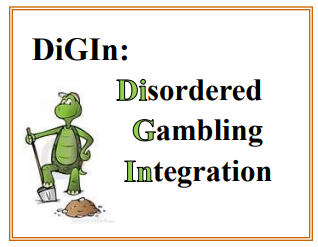The Disordered Gambling Integration (DiGIn) initiative makes gambling problems and behaviors a relevant topic of conversation when treatment is already being provided for substance use and mental health disorders. Providers can address gambling and problem gambling through enhanced screening, assessment, awareness, intervention, recovery and health promotion strategies.
Mission:
To increase the capacity of substance use disorder and mental health treatment programs to address gambling and problem gambling through enhanced screening, assessment, awareness, intervention, recovery and health promotion strategies. To make gambling problems and behaviors a relevant topic of conversation within the broader substance use and mental health disorder treatment communities.
DiGIn Participating Programs and Contact Information:
Region 1
Liberation Programs: Main Contact: Joanne Montgomery Joanne.Montgomery@liberationprograms.org
Region 2
Apt Foundation: Main Contact: Daniel Iead DIead@aptfoundation.org
Region 3
Sound Community Services: Main Contact: Lisa Moon lisa.moon@soundct.org
Region 4
Root Center for Advanced Recovery: Main Contact: Geina Palmer Geina.Palmer@rootcenter.org
Department of Veterans Affairs: Main Contact: Ebony Langston Ebony.Langston@ct.gov
Region 5
Connecticut Community for Addiction Recovery, Inc: Main Contact: Tammy Steele Tamara@ccar.us
McCall Behavioral Health Network: Main Contact: Jamie Calvano Jamie.Calvano@mccallbhn.org
Health Problems and Medical Service Utilization:
- At risk gamblers more likely to receive emergency room care and to be diagnosed with: Hypertension, Obesity, Severe Injury, Mood Disorder, Anxiety Disorder, Alcohol Use Disorder, and Nicotine Dependence. (National Epidemiologic Survey on Alcohol and Related Conditions, Morasco et al., 2006)
- Substance use disorders increase the likelihood of a gambling disorder by more than 4-fold. Over 20% of persons with substance use disorders have gambling problems. (J.Clin Psychiatry 2005;66:564-74. J Subst Abuse Treat 2014; 46:98-105.)
- Compared to non-gamblers, older adult problem gamblers are nearly 7 times more likely to be smokers, 6 times more likely to have an alcohol problem, and 3.5 times more likely to have a drug use problem. (Am J Geriatr Psychiatry 2007; 15:301-13)
- Persons with psychiatric conditions suffer from gambling problems at extraordinarily high rates, and up to one-third of persons with gambling disorder attempt suicide (Psychol Med.2008: 8:1351-60, J Clin Psychiatry 2005; 66:564-74., Am J Addict 2006; 15:303-10)


